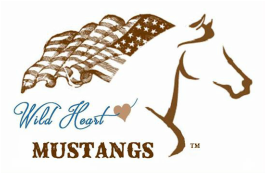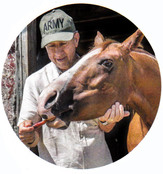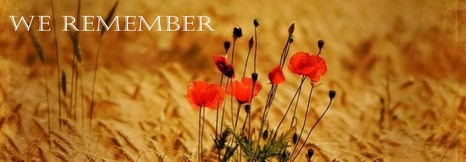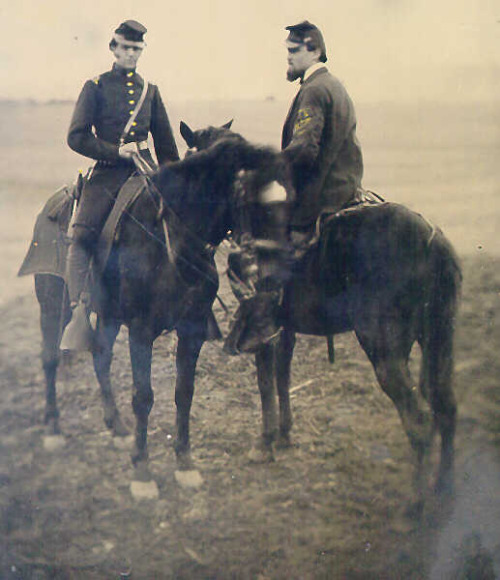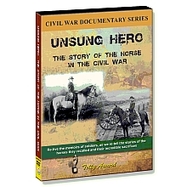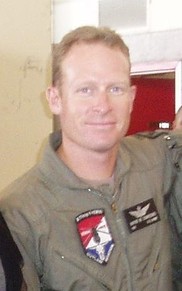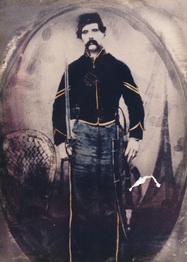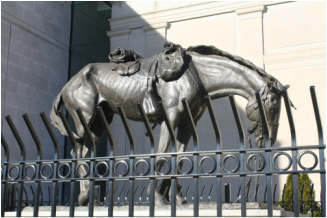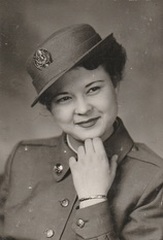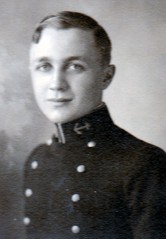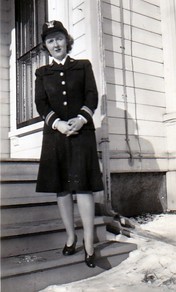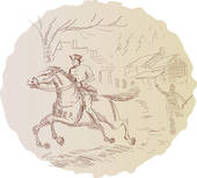RIDING FREEDOM'S TRAIL |
|
|
AMERICA THE BRAVEThe Wild Heart Mustangs logo features a strong symbol of something we feel passionate about - the American flag. The freedom that Americans enjoy has never been free. It's been defended and preserved by countless military men and women who've given their time, energy, strength, heart - and sometimes their lives - in the name of freedom.
This page is dedicated to those in the military now, and in the past, and to the families who watched, waited and prayed for the safety of their loved ones. Let us never forget those who have served this great country. Thank you ALL for your service! |
HORSES BRING PEACE TO A SOLDIER'S HEART
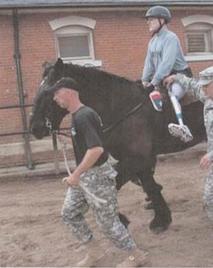
By David Sollars, MAc, LAc, HMC, DAIS and David Ferruolo, DAIS
Taken from October 2013 Combat Stress / The American Institute of Stress / www.stress.org
“I never thought I could learn so much from a 1,000 pound horse that can’t speak,” reflected Clint S., a veteran of Operation Allied Force, who spent five years in the Marine Corp. Clint was part of a pilot program at Ironstone Farm in Andover, MA to use horses to help veterans heal from what Tanielian and Jaycox (2008) call the Invisible Wounds of War. Clint’s story is indicative of countless veterans returning from battlefields in the Middle East. These combat deployments significantly effect the mental health of Soldiers with prolonged combat exposure, increasing instances of post-wartime related psychological issues (Spelman, Hunt, Seal & Burgo-Black, 2012; Cesur, Sabia & Tekin, 2013).
Mental health concerns in Soldiers have been well documented throughout United States history, but efforts to mitigate the problems have been lacking. During the Civil War, Soldiers suffered with a Soldier’s Heart. Battle Fatigue was the presenting issue during World Wars I and II and Shell Shock was written about during the Korean and Vietnam Wars. Today, depression, anxiety, and posttraumatic stress disorder (PTSD) are what affects veterans like Clint. Fortunately, these veteran issues have come to the forefront of societal awareness, and experiential therapies like Equine Facilitated Mental Health (EFMH) are being offered to help veterans heal from the traumas of combat.
THE FARM THAT HEALS
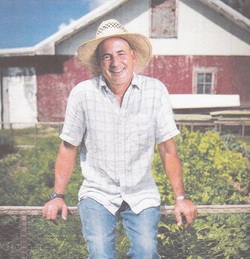 John Ress started this Illinois farm to help veterans get a fresh start.
John Ress started this Illinois farm to help veterans get a fresh start.
By Jennifer Billock
Taken from Eating Well Magazine November/December 2015 Issue / www.eatingwell.com
For veterans, this farm does more than grow crops.
On a small farm outside Chicago, active-duty soldiers and veterans are finding reprieve from the hardships of war. The Freedom Farm for Vets, founded by John Ress, is a 5-acre property with opportunities for vets to garden, work in a woodshop and take care of horses. Its mission is to alleviate post-traumatic stress disorder (PTSD) through farming and positive surroundings. "It calmed me down quite a bit," says Rob, a 30-year-old former Navy sonar technician who suffers from PTSD and asked that his last name not be used. "It helped me get my motor skills and memory back. And it keeps your mind off things." The farm acts as a safe haven for the 30 or so veterans and service members who come seeking shelter from the pressures of daily life and welcome the chance the get back in touch with nature.
Ress doesn't have a background in psychology, but grew up in a farming family. As a child, he watched his uncles return from war and saw how much farming helped them overcome the lasting effects. He started the non-profit five years ago as a way to help others recover as his uncles had.
Ress greets every veteran and gets to know them. "John's kind of like a bartender psychologist, except he's a farm psychologist," says Rob. In fact, the farm helped Rob so much that he's starting his own in Arizona, where he recently moved. "Farming is beneficial for post-traumatic stress because veterans can see the progress in what they've done," Ress notes. "There's a direct correlation between planting and starting over in life. They plant the seed, they watch the seed start to grown, then they bear the fruit of what they did. It really is self-help."
Taken from Eating Well Magazine November/December 2015 Issue / www.eatingwell.com
For veterans, this farm does more than grow crops.
On a small farm outside Chicago, active-duty soldiers and veterans are finding reprieve from the hardships of war. The Freedom Farm for Vets, founded by John Ress, is a 5-acre property with opportunities for vets to garden, work in a woodshop and take care of horses. Its mission is to alleviate post-traumatic stress disorder (PTSD) through farming and positive surroundings. "It calmed me down quite a bit," says Rob, a 30-year-old former Navy sonar technician who suffers from PTSD and asked that his last name not be used. "It helped me get my motor skills and memory back. And it keeps your mind off things." The farm acts as a safe haven for the 30 or so veterans and service members who come seeking shelter from the pressures of daily life and welcome the chance the get back in touch with nature.
Ress doesn't have a background in psychology, but grew up in a farming family. As a child, he watched his uncles return from war and saw how much farming helped them overcome the lasting effects. He started the non-profit five years ago as a way to help others recover as his uncles had.
Ress greets every veteran and gets to know them. "John's kind of like a bartender psychologist, except he's a farm psychologist," says Rob. In fact, the farm helped Rob so much that he's starting his own in Arizona, where he recently moved. "Farming is beneficial for post-traumatic stress because veterans can see the progress in what they've done," Ress notes. "There's a direct correlation between planting and starting over in life. They plant the seed, they watch the seed start to grown, then they bear the fruit of what they did. It really is self-help."
|
This issue of the WILD HEART MUSTANGS™
e-zine is DEDICATED to: |
If you have a special someone you'd like recognized here, please let us know!
|
|
George A. Durosko - US Army, 82nd Airborne Division, US Army National Guard, SM/SGT US Air National Guard - Korean War
George M. Durosko - US Marine Corps (1921 - 1924) Served in the Dominican Republic Occupation of US Forces. Part of the Dominican Expeditionary Force that battled a guerilla movement known as the "gavilleros". George M. Webster - US Army, 458th Medical Collecting Co of the 1st Army in England, France, Belgium, Germany (1940 -) WWII William V. Webster - M/SGT US Army, Army Air National Guard (1941 - 1983) WWII Charles R. Webster - MAJ US Army Air Corps, US Air Force Reserve, NY Air National Guard (1941 - ) WWII Charles P. Webster - CPT US Army - 8th ID in Baumholder and Bad Kreuznach, FRG, 1st CAV Divarty and 4-29 FA at Fort Hood; LT COL US Army Reserve 401st CA Bn - Bosnia-Herzogovina Charles M. Webster - CPT US Army - Served with 3rd Cavalry Regiment out of Fort Hood in Iraq and 1st Armored Division at Fort Bliss Edward A. Koagel - WWI Walter Koagel - WWI William H. Webster - WWI Norman Webster - WWI During the Civil War, mules weren't used on the front line because of their overwhelming sense of self preservation. They just would not run towards gunfire. So they were used for the back lines, transporting ammunition, supplies, and wounded soldiers. Sadly, the animals used in during the Civil War were so starved that they would eat the tail hairs off the horses walking in front of them. That helps explain the painful thinness of the War Horse statue.
|
Wayne M. Durosko, US Army
(Nov 1983 – Feb 2006) Active Duty; US Army (2006-2007) Test Pilot; US Air Force (2007 – present) Test Pilot. Gulf War – Southwest Asia Service, Iraq 1990-1991; Liberation of Kuwait, Kuwait (1990-1991); Operation Provide Comfort, Turkey & Iraq 1991; Bosnia Conflict – Operation Allied Force, Bosnia (Implementation Force) 1995-1996; Kosovo Conflict – Kosovo Campaign, Macedonia & Kosovo 1999; Iraq War – Operation Enduring Freedom, Iraq 2003, 2004, 2005 (3 tours) Hiram J. Webster,- Corporal - US Army - NY Cavalary Volunteers, Company K, 24 Regiment (1/9/1864 - 9/30/1864) Killed in Action Richmond - Petersburg Campaign (Peeble's Farm aka Popular Springs Church, Wyatt's Farm, Chappell's House, Pegram's Farm, Vaughn Road, Harmon Road) – Civil War
Civil War SoldiersMen like Hiram Webster weren't the only soldiers to serve during the Civil War.
Millions of horses and mules of the Confederate and Union armies were killed, wounded, or died of disease during the war. This statue in front of the Virginia Historical Society in RIchmond, Virginia commemorates their service and sacrifice. < This DVD from PBS presents the story of the millions of horses (and mules) that were used in all branches of both armies during the Civil War. It discusses how the horses were procured and trained for field use, how they were fed and maintained, and the toll taken on them due to service in the field. LEARN MORE
|
Mary Lorraine Webster Durosko, Pvt US Army
(1951-1952), WAC – Korean War Edward Bellamy McMillan, LTJG United States Navy,
1929-1934 Elizabeth Moore McMillan, LT
United States Coast Guard Active duty 1943-1946 USCG Reserve 1946-1955 < The War Horse memorial was designed by Tessa Pullan of Rutland, England, and given to the historical society by Paul Mellon.
[source: sisterhoodofthemuse. wordpress.com] |
RESOURCES for VETERANS
The American Institute of Stress - http://www.stress.org/wp-content/uploads/Newsletter/October_Combat_Stress_2013/?utm_source=October+Combat+Stress+2013&utm_campaign=October+2013+Combat+Stress&utm_medium=email
Professional Association of Therapeutic Horsemanship International (PATH) - www.pathintl.org
Iron Stone Farm (Andover, MA) - http://ironstonefarm.org/veterans-program/
Boulder Crest Retreat (Bluemont, VA) - Boulder Crest Retreat is the nation's first privately-funded rural wellness center dedicated exclusively to our nation's combat veterans and their families. We are committed to improving the physical, emotional, spiritual and economic wellbeing of this remarkable community of heroes, and ensuring they have the opportunity to succeed in their new mission - a life of passion, purpose and service - here at home. www.bouldercrestretreat.org
Heart of Horse Sense (Western NC) - This non-profit organization supports free Therapeutic Horsemanship, including Equine Assisted Psychotherapy and Learning, Therapeutic Riding, and Natural Horsemanship to veterans, their families and to at-risk youth. http://www.heartofhorsesense.org/veterans/
The Freedom Farm for Vets (outside Chicago, IL) - www.freedomfarmforvets.org
Veterans to Farmers (Colorado) - To provide American veterans of the Iraq and Afghanistan conflicts with pride, education and fulfillment through a permanent source of sustainable income, community and contribution: The family farm. www.veteranstofarmers.org
Farmer Veteran Coalition (National) - We cultivate a new generation of farmers and food leaders, and develop viable employment and meaningful careers through the collaboration of the farming and military communities. We believe that veterans possess the unique skills and character needed to strengthen rural communities and create sustainable food systems. We believe that agriculture offers purpose, opportunity, and physical and psychological benefits. www.farmvetco.org
Veterans Healing Farm (North Carolina) - We help empower veterans reintegrating into civilian life by growing produce, raising farm animals, and conducting seminars on holistic health and sustainability. www.veteranshealingfarm.org
Mustang Mentors (Texas) - The Mustang Mentor Program supports Veterans through providing a wild horse training experience. With the help of the Mustang Heritage Foundation, veterans choose a Bureau of Land Management wild horse, untouched by humans, and transform the horse in approximately 100 days to a gentle, adoptable animal. The veteran experiences the transformation from "wild to mild" within the horse. The previously wild horses are then placed into adoptive homes. Veterans learn marketable vocational skills and gain on the job training for a future occupation in the equine industry, if they choose.
